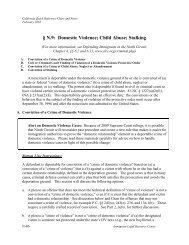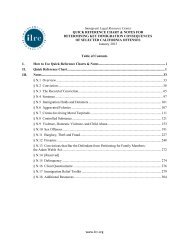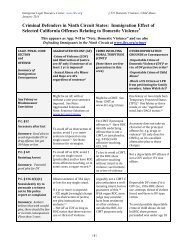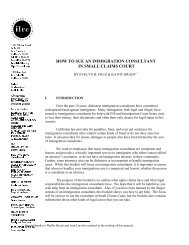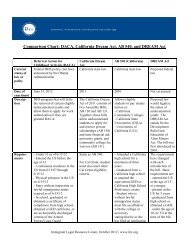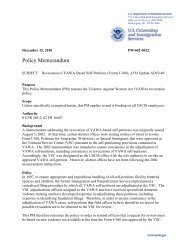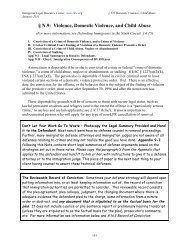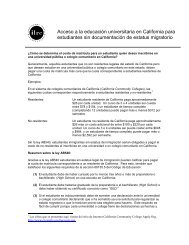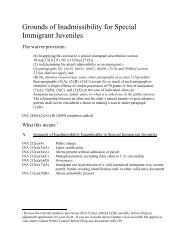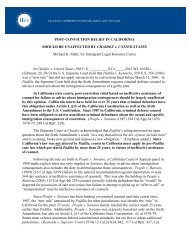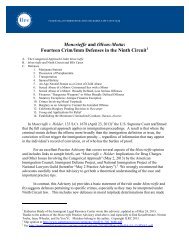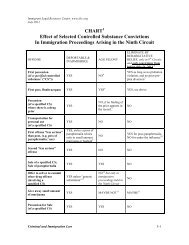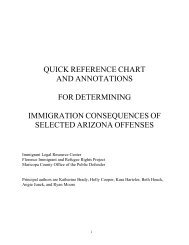quick reference chart and notes for determining immigration - ILRC
quick reference chart and notes for determining immigration - ILRC
quick reference chart and notes for determining immigration - ILRC
Create successful ePaper yourself
Turn your PDF publications into a flip-book with our unique Google optimized e-Paper software.
Cali<strong>for</strong>nia Quick Reference Chart <strong>and</strong> Notes<br />
February 2010<br />
Until you underst<strong>and</strong> the <strong>immigration</strong> case you should continue the criminal case, or if <strong>for</strong>ced<br />
to plead, should try to avoid a conviction that will trigger any of the grounds of inadmissibility,<br />
deportability, or constitute an aggravated felony. The most important of these three is to avoid a<br />
conviction <strong>for</strong> an aggravated felony offense.<br />
9. The Absolutely Removable Defendant<br />
Some clients are deportable with no possibility of relief, <strong>for</strong> example an undocumented<br />
person with no possible application to stop removal, or a permanent resident with a conviction<br />
that bars any possible relief. If they come in contact with <strong>immigration</strong> authorities, these persons<br />
will be deported (“removed”), or at best, permitted to depart the U.S. voluntarily (see below).<br />
If they wish to avoid this, their goal is to avoid contact with <strong>immigration</strong> authorities. The<br />
best way to do this is to avoid being in jail, where an <strong>immigration</strong> hold is likely to be placed on<br />
the person, who is then likely to be taken into <strong>immigration</strong> custody upon release from jail. After<br />
in<strong>for</strong>med consideration, such a defendant with no defenses may decide that it is in her best<br />
interest to accept a plea that gets or keeps her out of jail be<strong>for</strong>e she encounters <strong>immigration</strong><br />
officials, even if the plea has adverse <strong>immigration</strong> consequences. The defendant must make the<br />
decision after underst<strong>and</strong>ing the long <strong>and</strong> short-term life consequences (e.g., that such a<br />
conviction is likely to render her permanently ineligible to ever obtain lawful status).<br />
A permanent resident who is removable must continue to avoid any contact with <strong>immigration</strong><br />
authorities. The person must not travel outside the U.S., apply to renew a 10-year green card,<br />
apply <strong>for</strong> naturalization, submit a visa petition <strong>for</strong> a family member, or make any other contact<br />
with authorities.<br />
An absolutely removable person may want to apply <strong>for</strong> immediate “voluntary departure” to<br />
avoid <strong>for</strong>mal removal. For one thing, illegal re-entry following a voluntary departure is a far less<br />
serious offense than following a removal. Federal regulations state that an aggravated felony<br />
conviction will bar a request <strong>for</strong> pre-hearing voluntary departure. 28 (In fact, under the statute a<br />
noncitizen who entered without inspection is eligible <strong>for</strong> this type of voluntary departure despite<br />
conviction of an aggravated felony, <strong>and</strong> the regulation appears to be ultra vires. 29 )<br />
Many persons who are deported/removed re-enter the U.S. illegally. This is especially true<br />
if they have close family here. Counsel must warn the defendant that this “illegal re-entry,”<br />
especially where there are prior convictions, is a very commonly prosecuted federal offense,<br />
which can result in years in federal prison. See next section.<br />
28 8 CFR 240.25. This is “voluntary departure prior to completion of hearing,” meaning that the noncitizen does not<br />
request any relief other than the departure.<br />
29 8 USC § 1229c(a) provides that a noncitizen who is deportable <strong>for</strong> an aggravated felony is barred from prehearing<br />
voluntary departure. A person who entered without inspection is not “deportable.” See discussion at<br />
Chapter 11, § 11.22, Defending Immigrants in the Ninth Circuit.<br />
N-24 Immigrant Legal Resource Center



